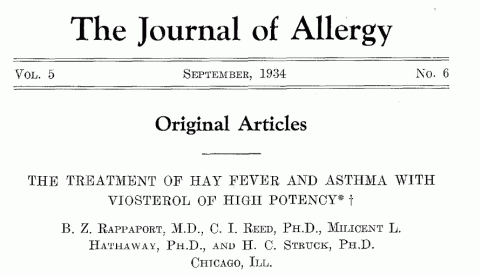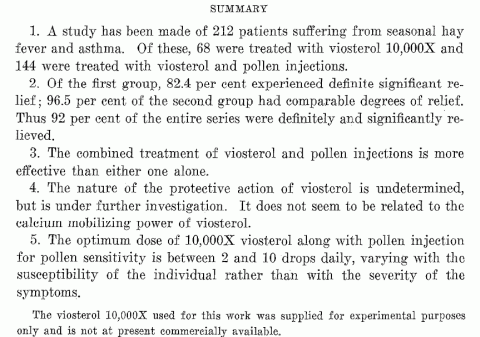Despite the known allergy promoting effect of vitamin D in early childhood, there is mounting evidence that it may have beneficial effects during specific immunotherapy. A paper on “IL-10-inducing adjuvants enhance sublingual immunotherapy efficacy in a murine asthma model” by researchers from a French allergen company published now in Int Arch Allergy Immunol 2008;145:152-162 shows
Following stimulation with VitD3/Dex-pretreated DCs, CD4+ naïve T cells exhibit a Treg profile. In contrast, a Th1/Treg pattern of differentiation is observed in the presence of DCs treated with L. plantarum. Both adjuvants significantly enhance SLIT efficacy in mice, in association with either induction of Foxp3+ Treg cells (for VitD3/Dex) or proliferation of OVA-specific T cells in cervical LNs (for L. plantarum). Conclusions: Both VitD3/Dex and L. plantarum polarize naïve T cells towards IL-10-expressing T cells, through distinct mechanisms.
More or less at the same time there is a report that “1alpha,25-dihydroxyvitamin D3 potentiates the beneficial effects of allergen immunotherapy in a mouse model of allergic asthma: role for IL-10 and TGF-beta” published in J Immunol 2008;180:5211-5222
In this model, the dose response of allergen immunotherapy 10 days before OVA inhalation challenge shows strong suppression of asthma manifestations at 1 mg of OVA, but partial suppression of bronchoalveolar lavage eosinophilia, IgE up-regulation, and no reduction of AHR at 100 µg. Interestingly, coadministration of 10 ng of 1,25(OH)2D3 with 100 µg of OVA immunotherapy significantly inhibited AHR and potentiated the reduction of serum OVA-specific IgE levels, airway eosinophilia, and Th2-related cytokines concomitant with increased IL-10 levels in lung tissues and TGF-β and OVA-specific IgA levels in serum.
Blowing out the fire with gasoline seems to work at least in the mouse model.
But will it also work in humans? Both papers do not cite earlier research, to be exact in the Journal of Allergy 1934;5:541 (the JACI precursor):


Although a placebo group is missing, this could point towards useful co-effects. It is also inline with a preceding JAMA paper of the same authors on 6 ragweed sensitive patients (1932; 2:105-109).
An ongoing study in Poland will show, yea, yea.